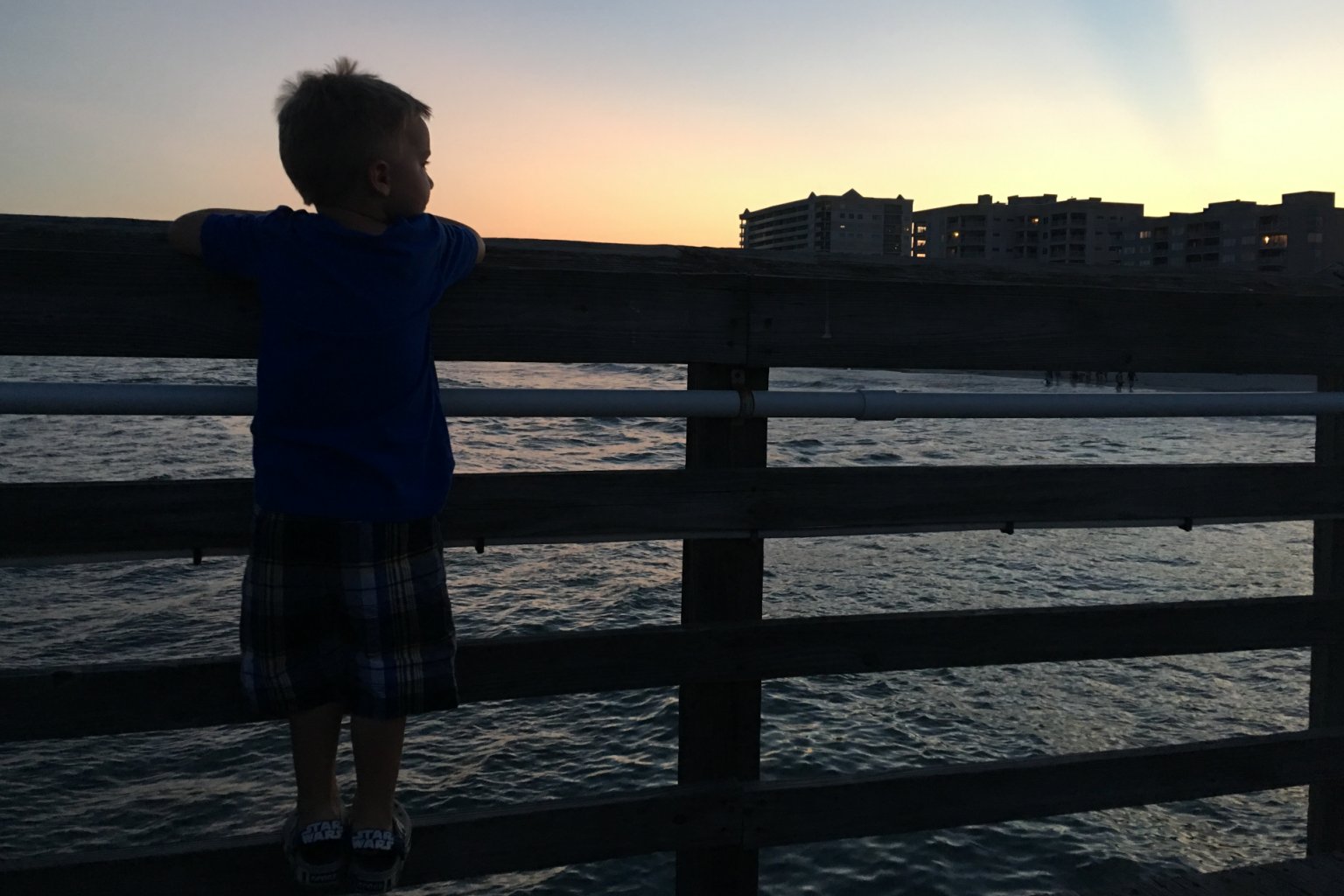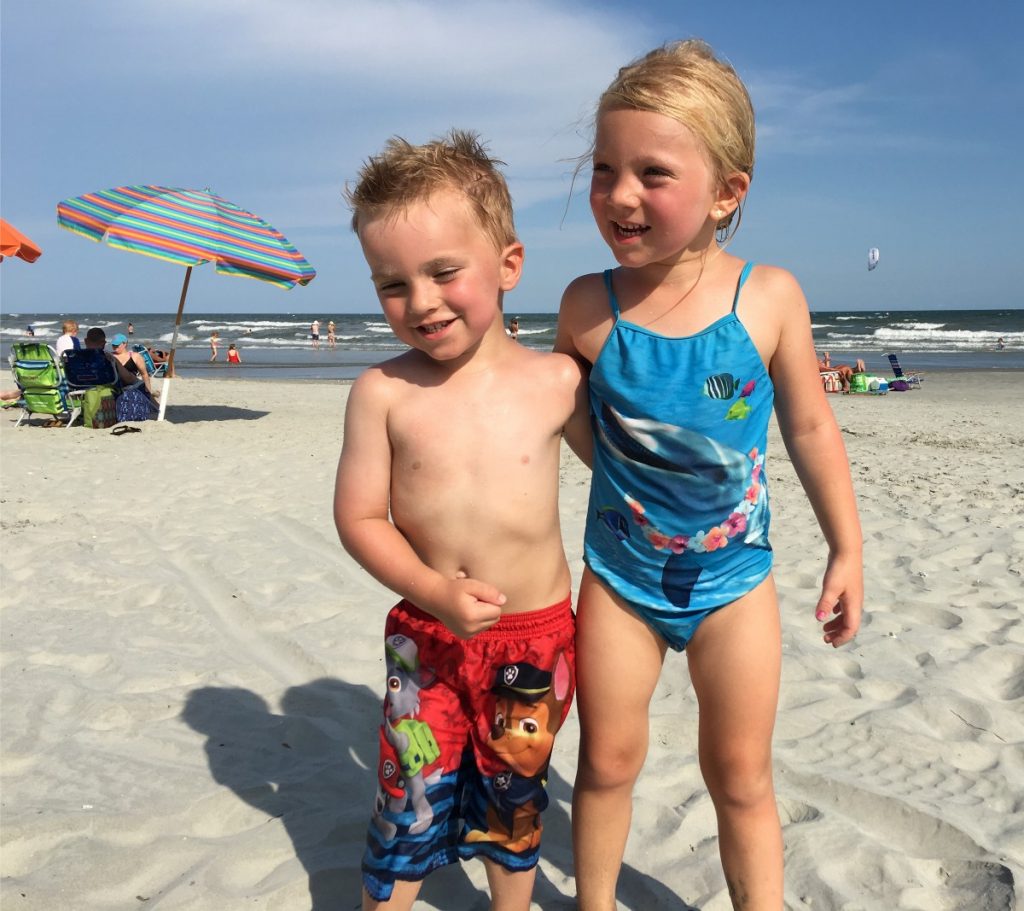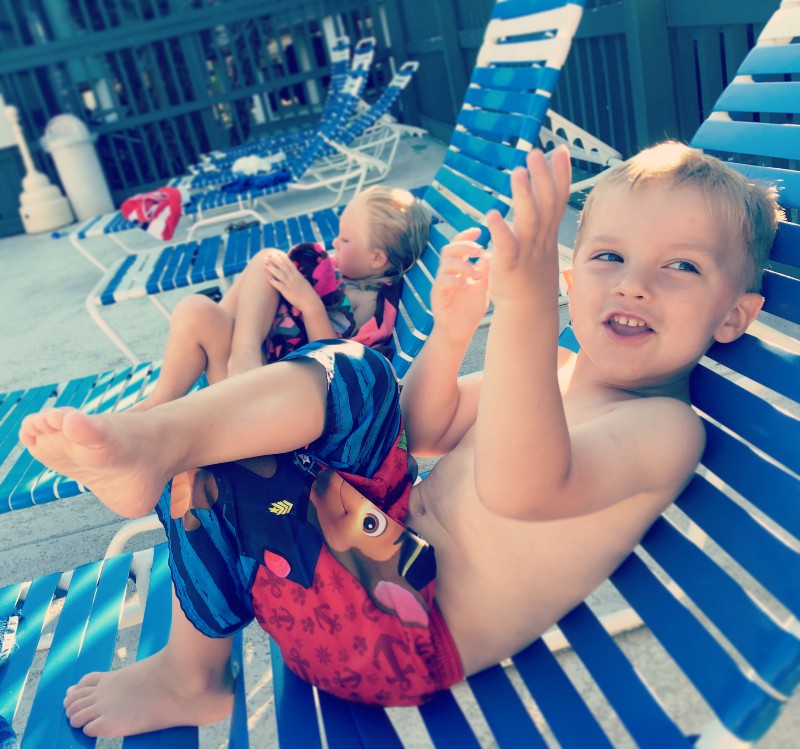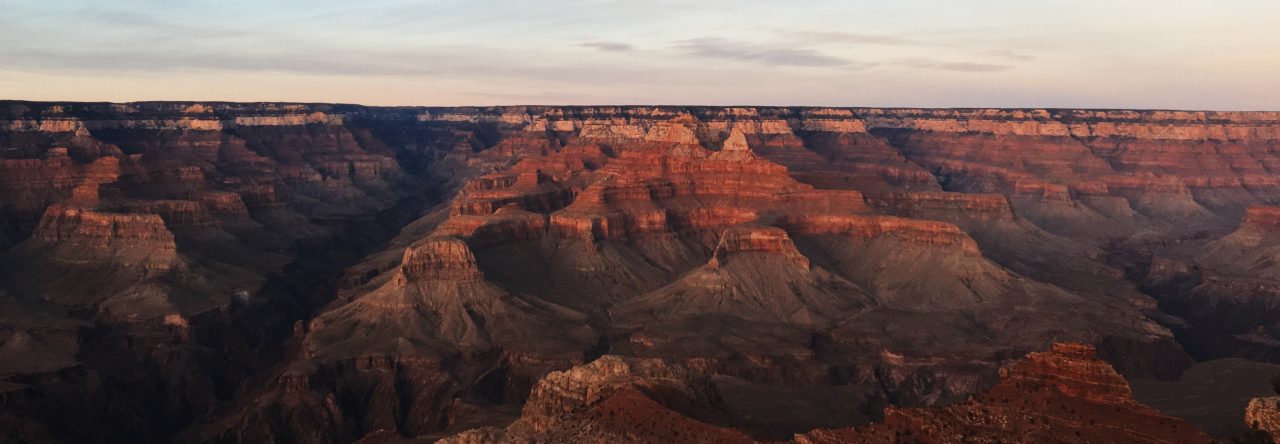LIFE WITH KIDDOS

There’s something existentially good about bringing your children to the beach.
The beach is a homing beacon, a pulse that corrects our attitudes, a constant. Even the first night, after we’d unpacked the van and made the inaugural supply trip and found a simple supper, even then, something compelled us to walk out on the pier, crossing the high tide below us in darkness, around the somber fishermen, their baited night hooks lurking forty feet down, above the sea, gentle and present and lulling us, back and forth, over and over, transfixed.
A fellow plucked a baby shark from the murky sea. The pup flopped about on the pier’s deck a bit until its new master, a grandfather who seemed preternaturally calm about handling even foot-long sharks, bare-handed it. My children gazed on as he pushed the hook back through and untangled his catch. “Want to touch him?” he asked.
Thomas looked up at me, and Julia, casual as ever, stepped forward, her fingers running with the grain of the pup’s scales. It was a classically composed specimen, speedy lines, its nose pushed over its jaws, a startling countenance even in miniature. Thomas joined in after determining the catch wouldn’t, in fact, attempt to kill him. We saw another shark hauled up in our twenty minute walk down the pier and back; it might have been the same shark caught twice, maybe just a young, dumb bloke who was the only thing swimming around out there, the lure of another chunk of shrimp too good to pass up.
This was our first vacation in some time with only our nuclear family, and our first ever as parents of three children, and we began the endeavor with one important player on the bench. Kelly was battling a stomach bug, and shortly after we arrived, she withdrew for sleep and rest and liquids and mostly stayed put for forty-eight hours. I have come to understand that nursing a baby provides some kind of magic immunity, and even as I type this, I’m knocking on the wooden armrest of this Adirondack chair. God willing, Annie makes it through unscathed.
But as I have frequently said, Kelly is our family’s varsity parent. She is the crew chief, the organizer of Children Things, the toddler whisperer, the snack-fixer, the outfit-picker, the primate of our home. She is normally such an outstanding parent as to be adequately functional even while ill, but this particular strain of nastiness left her waylaid, weak as a kitten and unable to keep food or water for long.
So there we were, a few hundred miles away from home, and suddenly I was playing lead parent.
As it turns out, I can fake my way through a lot. I did not realize that the reason we always have two cans of cocktail nuts in the house is because Thomas likes mixed nuts, while Julia prefers only peanuts, but eventually I figured this out, as well as other remedial skills, like how to make a mean cold-cut and cheese roll-up, expertly melted in the microwave.
Taking both kids out to the beach was a different exercise. For the unaware: I’m not a ready-made beach booster. I don’t like getting sand everywhere or swimming in water in which other living things besides human beings are present—especially water in which only twelve hours ago we determined resided at least infant-sized sharks. I looked out and quietly counted the kids bobbing in the water, trying to come up with ballpark odds in a truly morose fashion.
Then I breathed deeply, sprayed the kids down with sunscreen (something that with enough time becomes a different kind of family ritual), and jogged backwards into the water to watch the kids’ faces as they splashed into the water for the first time, their eyes alive with wonder.
I am not a particularly strong swimmer, so I kept our progeny within a few paces in the water. Julia immediately floated out, fearless as is her style now, while Thomas obediently kept close by. (Though he can be wrecking-ball tough, the boy seems to share his father’s sense of reserve around bodies of water.) Ten minutes later, when we emerged for our first trip from ocean to sun chairs, a pudgy boy of about twelve walked up on the beach, a large Tupperware bowl in his hand, to ask if we wanted a jellyfish. Sure enough, he had one floating around in there, pulsing about like a Bach prelude.
This did not help my anxiety of swimming around in murky water.
So I suggested to the kids that we go and play in the sand, something they were ready to do anyway. Thus began our faithful habit: burrowing in the powdery stuff, shoveling it here and there, making little casts of towers and sea horses until we were sweaty; then bouncing back down to the water, the initial several steps warm, a rush of cool with the first breakers, until they were belly-deep and giggling with the foam about them; then back to the sand; then back to the ocean. Rinse, repeat, re-apply sunscreen.
After several cycles I grew comfortable with our routine, ease that came just in time for us to pack up and come back to the condo for lunch.
I am of firm belief that beach vacations require a temporary suspension of normal dietary rules. Breakfasts are indulgent: omelets, pancakes, or in my case, buying a box of cereal for the first time in a long while. Lunches are to be taken in residence and with great preference for the consumption of garden tomatoes. There is nothing like coming off of the beach, sweaty and gritty, your lips and mouth tinged in saltwater, and eating a tomato sandwich with mayonnaise on soft white bread. Nothing like it. I did not invent this idea, but I revel in its celebration. And all dinners should be eaten in local restaurants. At least one supper is required to include broiled and seasoned shrimp and cold beer, but no one is punished if all dinners are likewise constructed. Extra points, in fact.
Yes, this carefully imagined beach vacation is about throwing away restraint, but it’s also about grounding, about repetition and learning and deliberate thought. About hearing your kids in the back of the van as they announce roadside minutia in sing-song voices, about the buzzing lights of the cold grocery store, about the dank smell of tide pools, about chlorine dreams, about swarms of adolescents lining up for miniature golf, about beach knick-knack novelties.

Kelly decided she’d had enough of the stomach bug and went to an urgent care clinic, a place of such gravitational potential that time crawls along in agonizing ticks. They gave her two bags of intravenous fluid in a visit that consumed an entire afternoon and early evening. She emerged rehydrated but worried she’d missed the entire vacation. It was an early bedtime.
With the kids in bed asleep for the night as well, I busied myself with ordinary tasks, busing the kitchen table, washing the dishes, cleaning out the coffee pot for the next morning, carrying the trash and recycling to the dumpsters. The resulting order was oddly calming.
This next morning, with Kelly in good enough shape to at least make the walk to the beach, we again ventured forth. We rented a pair of chairs and umbrella for the day, rousing a teenage girl from her mid-morning sun-soaked slumber. Everyone who works at the beach has an enviable bronze sheen. The lifeguard was nearly mahogany. The umbrella girl drove a heavy iron spike deep into the ground and fixed us up, and we stretched out on teak wood and blue canvas chairs. We applied sunscreen. Within minutes, the kids were ready to play in the water.
Kelly stayed under the shade with Annie, and I followed the kids down. It was already easier, the shark mongers and jellyfish boy more faded memory than urgent harbingers.
Back and forth, water and sand, sand and water, sunscreen.
We decided to build sand castles. Originally, the idea was pitched as competition: Jules and Thomas on one team, Annie and me on the other, an effort to see who could compose the most striking sandscape architecture.
But the sand was too soft and powdery for building, so I assumed the role of Sherpa, ferrying countless gallons of saltwater in plastic beach-toy buckets, only to watch them gleefully and immediately emptied by two children so covered in granular substance that they resembled aboriginals. So began another trip, and another, and another. Repetition, learning. The tide was going out, which lengthened each journey to the water’s edge.
Just when the sand reached a moisture point that might enable enough cohesion to begin sculpting, the kids once more were ready to go play in the water. We abandoned our castles, which better resembled sad, damp foothills.
After our requisite lunch and tomatoes, we settled in for a siesta. This is among the most blessed times of any beach trip, a time when the sun is relentlessly hot, when even the breeze has fled, and the kids are listing with fatigue. I turn on the Golf Channel and stretch out on the couch and lose consciousness, surrendering to the ceiling fan gods.
In the mid-afternoon we reassembled and, renewed, returned to the shore. Kelly stayed home to nap more–the morning trip was enough for her. I am alone with the kids and the beach again.
Maybe it was the nap, or maybe it was the beer I had with my tomato sandwich, but this time I am so at ease, I decide to stay in the chair under the umbrella. The kids inspect the northward and southern mounds of sand before our chairs, what’s left of our earlier castle exercises, and opt instead to convert them into sand-cookie bakeries.
Even sand bakeries require water, but I am determined to remain en-umbrellas-shadeus, so I suggested the kids work in tandem to bring a pail of ocean up to our spot. I watched as they ran together toward the whitewater, the plastic bucket bouncing behind them, and suddenly I was caught in the moment.
Consider the full scene: we are surrounded by UVF-protected humanity, a full spectrum of folks young and old. Here is vitality and mortality, a gaggle of teenagers, a pair of retirees, college kids and their vague red cups, young children dotting the beachhead like fowl, their parent-keepers close by. Here is sexuality and vulnerability quite mostly unclothed. Here is exuberance and consumption and absolution and redemption. Here is the burial ground of caring about anything else.
And there are my children two hundred yards away, framed by an enormous Atlantic breaking violently behind them, their sinewy frames tautly holding up a bucket full of water, their strain slipping into laughter as it splashes onto them as they stutter-step away from the azure horizon. Desperately young. I am so happy my heart hurts.
My friend and the Dean Rusk professor at Davidson College Chris Alexander published an essay this week in the Washington Post that offered advice to parents dropping off their children for college. I’ve been thinking about it since I read it.
In short, Chris suggested that kids need their parents more, not less after they reach college; that college students often suffer an odd form of academic myopia; that the best thing you can offer your college student is your adult long-term perspective; and that the only way to be taken seriously is to avoid getting involved with the day-to-day, myopic dramas your college kid inevitably acts within. Which is to say, don’t get caught up in roommate sagas, don’t get upset with the profs over grades, don’t stay foolishly intertwined with your college-aged child’s dating scene. Instead, give them room and perspective and time.
I couldn’t help but think of my own children through this lens. Of course my friend was writing about college kids, who in most legal circles are considered bonafide adults, while my kids are staggered at ages at which they require help with tasks ranging from getting dressed to wiping poop. Still, I wondered about the idea of distance as a parent of young children, something that seems counterintuitive in a time when modern parenting demands conspicuous presence.
Such distance might not have measured much on the beach this week, but it mattered. To see them, muscle and skin, their sunscreen-slathered bodies racing back and forth from my chair to the water and back again, surprisingly small against a sky that might swallow them–it reset my place as a father. I was able to look out and see them and wave and see them wave back.

When we collected our various plastic toy miscellany and the cooler and beach bag to come off the sand for the day, a cavalcade of thunderheads arranged themselves like sentinels along the western skyline. We showered and changed for dinner, driving out to a place known for letting you pick your fresh seafood and fixing it for you right then and there. We were too late–the line for orders was more than an hour long–so we went to the mom-and-pop place next door and waited for a table.
The kids sat in a rustic booth with crayons, coloring while we ordered grilled fish and shrimp and crab cakes. On a television in the corner, in another galaxy, a man with an orange face was formally declared the Republican nominee for President of the United States. I snacked on hush puppies with warm butter, and that helped. The place buzzed with young girls waiting tables–their gender did not elude Julia, who pointed this out among other observations, truly they either miss everything or nothing at this age–and we ate our meals and I paid the bill and we left the restaurant to find the thunderheads had found us.
A classic scramble-dash to the van amidst a summer downpour ensued, punctuated by a trip down the ocean-front boulevard that more resembled a flotilla, the gutters so full of rainwater that the streets became flooded, rooster tails kicking out as we drove, the splatter of rain on the windshield unrelenting. We came up to our condo, and Kelly took Annie to the back bedroom to nurse, and I read Thomas and Julia their bedtime stories and tucked them in. Then, again, the ordinary: straightening up, dishes, coffee pot, trash, recycling, order, calm.
I brought my laptop out here onto the balcony to write, the storm retreating over the great, black sea, strobes of lightning cutting the outlines of these vacation towers, of the distant clouds, bolts occasionally wandering out of their cloud-homes and reaching all the way down, plunging electric into the deep. Vacation balconies become popular refuges during storms; from somewhere I hear a group of teenage girls rapping poorly along to a song played over the speaker of a mobile phone; somewhere else their counterpart boys roughhouse on a landing, bravado cries echoing in the condominium quad, staccato shouts underlined by distant thunder.
Eventually a full moon slides out from behind the clouds to pull back the ocean for the night. Though they are asleep inside, in this postlude wind I smell my oldest daughter’s hair when she tucks her head under my chin, I feel the smooth skin of my son’s tender feet, I hear my youngest daughter’s early laughter. I see Julia’s blonde strands nearly white in the saccharine light of morning, the darkening tan on Thomas’s legs, the gaping smile as Annie greets us.
I used to worry about the distance from my children I felt as the junior varsity parent. But here at the beach, in the repetition of blessed and wonderful things, I discovered that distance brings its own perspective, one that’s surprisingly close.






Leave a Reply